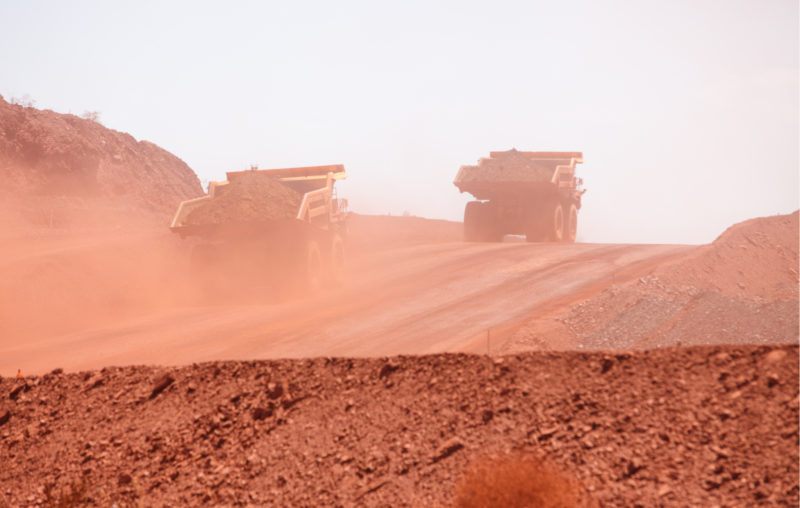You Can Stop Rio Tinto Mining…By Paying For It!

A few weeks after the anniversary of Karl Marx’s birthday, I’m thinking about the sacred and the profane. As one of The Communist Manifesto’s most iconic lines, it is meant to show an unscrupulous ushering in of the new capitalist mode of production, a ruthless profit-seeking that cares nothing about what came before it or the value that society, workers, or bystanders place on some aspect of life.
In short, it deals with all that’s ostensibly wrong with free markets and capitalism (or “innovism,” or “market-tested betterment”).
What prompted this reflection was the news about Rio Tinto, a mining company, which recently expanded an iron ore mine in the Hamersley Ranges in Western Australia. The area in question was an ancestral Aboriginal site where archeologists a few years ago found some 4,000-year old human remains, a site probably inhabited for as much as 50,000 years. A vast human treasure. In their rapacious quest for valuable ores to sell for profit, the mining company ignored the cultural value of Aboriginal people and the archaeological value the site might provide for scientists (to clarify, the company’s actions were within Australian law).
Iconic “money vs culture” struggles don’t get clearer than that: powerful capitalist interests against those desperate to save the remains of a millennia-old cultural artifact. More than one commentator voiced concerns over colonialist history here, perhaps invoking comparison to Spain or Portugal’s ravishing of Latin America in the four centuries following Columbus.
In other words: typical political conflict. Group A wants to keep the site as is; group B wants to extract the raw materials underneath, which provide jobs and incomes and profits. Both groups cannot be satisfied, and so we have to fight for political power, via elections and activism and corruption until my side wins out over yours.
Or, do we?
Let me offer another option, often overlooked by those who fail to understand what markets and systems of private property do.
Trade and Subjective Value
Most people reared in the bewitching magic of politics see only one way for societal conflicts to be solved: through democratic elections, we reach consensus. More cynically, we must staff the government with “my” team, and use the power of government to enforce “my” policies. The world is evil and corrupt, and only my team’s superior insight and moral values can fix that. It doesn’t matter if members of the other team disagree; we voted, and I won.
Instead: how about we just… trade for it?
Markets in capitalist systems are a way of sharing information: information about what we have and where we have it, information about what people want and when they want it. The interplay of these actions is what we call capitalist markets, ushered along with entrepreneurs trying to divine what we want tomorrow – and profits being rewarded to those who figure it out.
It’s a different kind of collective decision-making than the democratic-voter model we intuitively think of. If I want a pink shirt, but you desire a green one, we can both be happy as long as there are sewers and spinners and dyers and cotton farmers who believe they can turn a profit producing differently-colored shirts. Your taste and opinion are irrelevant. When governments captured by my team clank down on production of green shirts, we can no longer both be happy; I wield the power of government over things that should be none of my business.
Looking at political decision-making through this lens illustrates a fundamental problem with modern politics, one that progressives have slowly come to realize during Trump’s dynasty at the White House. A state with the power to implement the widespread reforms you dream of also has the power to undo them; sooner or later, the awesome power you entrusted with government will one day pass into your opponents’ hands, allowing them to wield it against you. The desire for Big Government backfired.
Issues that are mutually exclusive are slightly trickier, as with the outcomes in the mining dispute: I can’t have my site intact if you turn it into an iron ore pit. Can markets really solve that conflict?
Yes, as economists from Arthur Pigou and Ronald Coase to Jean-Jacques Laffont have argued for decades. Pointing to, respectively, internalized externalities, transaction costs, and auctions, they showed how subjective valuation of goods that become embodied in market prices can solve political economy questions too. Offer the mining company a large enough sum of money and they’ll be happy to give up the site.
If you want to be the one to make decisions about the use of a resource, we have an established system for that: tradeable property rights; If you want to decide whether a plot of land is farmed, deforested, or subdivided for real estate, you must first buy the land. If the archeologists and activists and Aboriginal tribes value the site more than the money offered, giving up the dough is a great gain for them; the mining company will similarly give up the site if they are offered more than the value they see in it.
This is the crucial insight of Ronald Coase’s famous theorem: if we abstract from transaction costs (and that’s a big if), it doesn’t matter who initially owns a resource – by trading, it will find its way into the hands of those who value it most.
What if we don’t have the money?
This objection, if it did, no longer holds. In the information age (where I learned of the Rio Tinto story from an American professor, who in turn got it from a rare book collector, who read it off an Australian news site, which indignant The Guardian readers saw on Tuesday) this story has been seen by hundreds of thousands, if not millions of people. If they chip in even $10, $20, or $100 each, I’d be surprised if they wouldn’t have their calls to the relevant mining executive returned.
If your team can extract more archaeological, spiritual and cultural value from the site than Rio Tinto can extract monetary value, they won’t refuse the offer. So, can you?
A movement that can get world leaders to tearfully listen to a teenager should have few problems in raising some funds for a cave that contains traces of early humanity. Darn, I’ll even pitch in – and I’ll visit the museum too and be happy to pay a premium for a knowledgeable member of the Puutu Kunti Kurrama tribe to tell me about its cultural significance.
Raising funds for that kind of initiative hardly seems difficult (especially not in a zero-interest rate environment). A college drop-out can raise $40 million for a project to clean the oceans and a futuristic solar-powered car could raise $60 million; why, then, couldn’t archeologists, science foundations, IWGIA or Greenpeace activists pool some of their cash to ensure the future of the caves that they treasure?
If that’s too profane for you, consider this: we already weigh competing values against each other, with various emissions trading schemes that allow polluting companies to continue operations but pay carbon taxes to internalize some of the harm on others. Money already adjudicates between conflicting uses of common resources such as rhinos or mountain gorillas (food, hunting, eco-tourism etc). In my environmentalist youth, we used to buy up unprotected primary forest which an NGO monitored and protected from clearcutting – something local communities, companies, and even middle schoolers still do. Iceland’s fishery quotas turn fisherman’s catch into tradeable perpetual assets, where those who place the highest value on the fish end up with the right to fish. What makes us think that money couldn’t adjudicate the many competing uses for this gorge in Western Australia?
An in-depth example to hammer home the point: wolves of Northern Europe and North America. Urbanites love wolves, but have probably never seen one; they like the idea of a balanced ecosystem. As all the costs fall on sheep farmers and others with livestock, they might think differently. Fortunately, there’s a way to align their incentives: pay for what you value by reimbursing the farmer.
For wolves, this is usually done in two ways: first, compensate costs associated with having wolves around (occasional ruined fences and dead sheep). In the U.S. such compensation is now paid for by the Federal Government, but used to be done through private donations to the Defenders of Wildlife foundation.
Second, pay ranchers for having wolves around; efforts like Wild Sky Beef in Montana pay “direct cash payments” to ranchers who can show wolves on their lands, and they can sell their goods at higher prices. By “providing ranchers financial rewards for living with wildlife,” states the project’s website, they incentivize farmers who would otherwise be hostile to wolves, “to create an environment where ranchers view wildlife as an asset rather than a liability.” Commenting on the initiative in a superb article earlier this year, AIER Senior Fellow Mike Munger wrote:
“With payments such as this, wolves become worth more alive than dead. If ranchers can find a way for wolves to co-exist with their cattle, they could come out much further ahead. If people really do value wolves sharing habitat with cattle, they are willing to pay more for beef that such ranches produce. And private donations change nearby wolves from threats to income-producing assets.”
What economics does is illustrate and formulate trade-offs. The way in which people display their subjective values to others is through market prices. If one group wants something that another group vehemently does not, markets provide an ingenious conflict resolution, one that takes individual subjective values into account rather than whoever wields the awesome power of government.
To prevent a mining company from using land sacred to someone else, there exists a payment of money such that the conflict can be resolved. You just have to find it, negotiate it, raise the money – and pay. In the age of vast crowdsourcing and rapid information, that shouldn’t be much of a problem.









